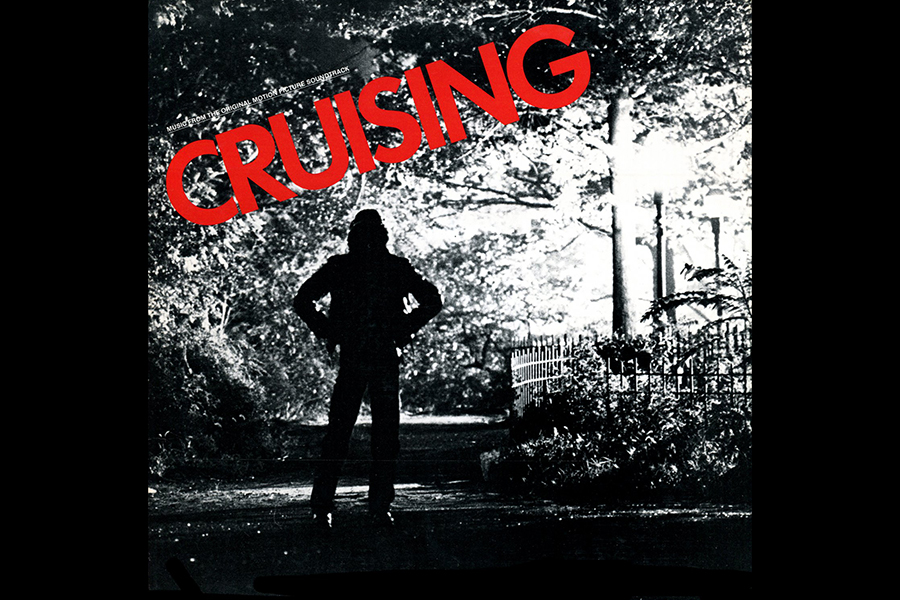The controversy surrounding the 1980 film “Cruising” — a psychological thriller about a serial killer preying on gay men in 1970s New York City — will probably never die.
But the original soundtrack lives on — and has actually gotten new life with a recently expanded re-release on the Waxwork label across three vinyl LPs.
The re-release offers music that never made it onto the originally released 1980 soundtrack, including five rare Germs songs recorded specifically for the album. It also has a new leather-faced cover that’s sure to arouse curiosity.
The film “Cruising” by director William Friedkin — who also directed 1973’s “The Exorcist,” 1971’s “The French Connection” and 1970’s gay classic “The Boys in the Band” — is set in Manhattan’s Meatpacking District leather-bar scene at the tail end of the ’70s. The murder-mystery finds Al Pacino at his twitchiest as a police detective who goes undercover in the city’s S/M gay subculture to nab the serial killer.
Turning himself into a decoy, the Pacino character learns what he believes are the rules and signals of the cloistered S/M society and heads into NYC’s dark, famed leather spaces, such as The Anvil, Ramrod, Mineshaft and Eagles Nest — the latter two of which barred Friedkin from their premises when they discovered how demonizing of the gay community the director was (to say nothing of building upon clichés too tired even by ’70s standards).
The NYC gay community protested loudly about the making of the film as it happened, even disrupting many of its nighttime street shoots. While gay-rights advocates objected to the film’s turning the leather scene as a whole into a perverted nightmare, the man who wrote the newspaper articles that inspired the script, Arthur Bell, eventually called the film “the most oppressive, ugly, bigoted look at homosexuality ever presented on the screen.”
At the same time, however, the community was also frightened. Released one year before the first reports of AIDS-related illnesses in New York City, the gay community in 1977-78 was already terrorized/demonized by the six gay “bag murders” — where each victim was mutilated, dismembered and their remains wrapped in black plastic bags. These mindless killings were what inspired Friedkin to make “Cruising.”
But what inspired him to craft such a dark film with the even-darker sounds of hardcore punk (The Germs), rolling funk (Mutiny) and barrelhouse rocking blues (Willy DeVile) at a time when disco ruled the gay dance floor?
Those questions and more can now be considered anew with the re-release.
Disco by the end of the ’70s had become the mainstream pop charts’ de rigueur go-to setting, as well as the soundtrack to gay dance floors across the country. Friedkin was looking for something beyond Donna Summer and KC and the Sunshine Band.
“I didn’t think [disco] fit the mood of the film, so I decided to replace it,” stated the director in the reissue’s liner notes.
What he and legendary producer and music director Jack Nitzsche came up with was something aggressive, hostile and unsympathetic to its characters and their dance floors, but one that equally matched the film’s insistently averse tone.
One way this happened was through the use of Mutiny’s ugly, but danceable, brand of heavy funk on “Lump” and “The Ballad of Captain Nymbad.” The same can be said of Mutiny bassist Barre Phillips’ “A-I-A” and its sweat-filled pulsating grooves and elegiac melodicism. Who danced to that?
DeVille, one of the punk era’s greatest vocalists (and a favorite of Bob Dylan), sounds so rowdily masculine and over-lubricated on the “Heat of the Moment,” it would be comical if it weren’t so beautifully brawny. Even the queercore likes of Rough Trade and their trip of tracks such as “Hurry” were gloomily out of touch with the mainstream, yet justifiably dank for “Cruising.”
What sets the densest tone of dread, however, is the use of The Germs’ disturbing and rabid brand of hardcore punk. Legendarily closeted and drug-abusing Germs frontman Darby Crash made moodiness and menace his best friends on the contagious “Not Alright,” the clammy “My Tunnel” and the disturbingly lurid “Going Down.”
Maybe this wasn’t what was the musical reality of the “Cruising” soundtrack in 1979-80 when poppy disco ruled the roost, but it’s just what the film’s impending doom needed — especially considering the heartbreak of AIDS that would follow this flick’s release.

